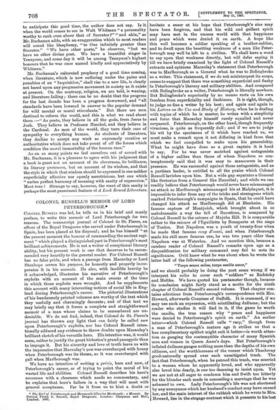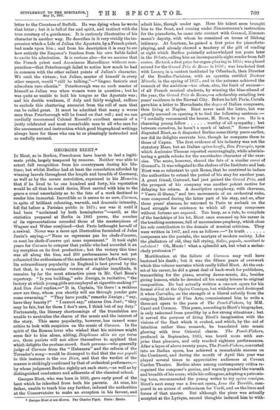COLONEL RUSSELL'S MEMOIR OF LORD PETERBOROUGH.*
COLONEL RUSSELL was led, he tells us in his brief and manly preface, to write this memoir of Lord Peterborough for two reasons. The manuscript journal of Colonel de St. Pierre, an officer of the Royal Dragoons who served under Peterborough in Spain, has been placed at his disposal ; and he has himself " at the present moment the honour of commanding the ancient regi- ment" which played a distinguished part in Peterborough's most brilliant achievements. He is not a writer of exceptional literary ability, but his present work is one that deserves to be recom- mended very heartily to the general reader. For Colonel Russell has no false pride, and when a passage from Macaulay or Lord Stanhope serves his purpose, he honestly and properly incor- porates it in his memoir. He also, with ]audible brevity be it acknowledged, illustrates his narrative of Peterborough's exploits with an account of the main events of the time in which those exploits were wrought. And he supplements this account with many interesting notices of social life in Eng- land during Peterborough's career. The pictorial illustrations of his handsomely printed volumes are worthy of the text which they usefully and charmingly decorate ; and of that text we may briefly say that it forms a complete and straightforward memoir of a man whose claims to be remembered are un- deniable. We do not find, indeed, that Colonel de St. Pierre's journal has thrown any light that can fairly be called new upon Peterborough's exploits, nor has Colonel Russell inten- tionally adduced any evidence to throw doubts upon Macaulay's brilliant sketch of his versatile hero. His intention was, it would seem, rather to justify the great historian's grand panegyric than to impugn it. Rat his sincerity and love of truth leave us with the impression that Macaulay's pen was overcharged with honey when Peterborough was its theme, as it was overcharged with gall when Marlborough was.
We have no intention of writing a precis, here and now, of Peterborough's career, or of trying to point the moral of his wasted life and abilities. Colonel Russell describes hie hero's successes with a clearness which needs no commentary, and he explains that hero's failure in a way that will meet with general acceptance. Far be it from us to hint a doubt or
• The Rea of Peterborough and Monmouth (Charles Mordeurd) : a Memoir. Hy Colonel Prank s. Russell. Royal Dragoons. London Chapman and Hall, Limited. 18E7.
hesitate a sneer at his hope that Peterborough's sine may have been forgiven, and that his wild and gallant spirit may have met in the unseen world with that happiness and peace which were denied it on earth. A hope like this well becomes a soldier speaking of a brother-soldier, and to dwell upon the besetting weakness of a man like Peter- borough may well be left to a civilian. We shall have a word to say upon that weakness directly, but will defer saying it till we have briefly examined by the light of Colonel Russell's extracts and opinions Macaulay's statement that Peterborough was to Marlborough as a General what he was to Bolingbroke as a writer. This statement, if we do not misinterpret its scope, seems to suggest that there was something superficial and flashy in Peterborough's literary and military abilities. And compared with Bolingbroke as a writer, Peterborough is literally nowhere. But Bolingbroke's superiority by no means rests on hie own freedom from superficiality and flashiness. It is right, though, to judge so fine a writer by his beet ; and again and again in his Letters on the Use and Study of History, when he is dealing with topics of which he is master, he writes with a simplicity and force that Macaulay himself rarely equalled and never surpassed. Peterborough, on the other hand, though frequently vivacious, is quite as frequently dull ; and if we are to judge his wit by the specimens of it which have reached us, we must make a remark upon it not differing in kind from that which we feel compelled to make upon his generalship. What he might have done as a great captain it is hard to say. For he was never matched against antagonists of a higher calibre than those of whom Napoleon so con- temptuously said that it was easy to manconvre in their presence. He was successful against these antagonists, and as a partisan leader, is entitled to all the praise which Colonel Russell lavishes upon him. But a wide gap separates a General like Sertoriva from a General like Hannibal ; and while we can readily believe that Peterborough would never have mismanaged an attack as Marlborough mismanaged his at Malplaquet, it is impossible to infer from any of the tricks and stratagems which marked Peterborough's campaigns in Spain, that he could have changed his attack as Marlborough did at Blenheim. His famous capture of Montjuich, which brought about in so melodramatic a way the fall of Barcelona, is compared by Colonel Russell to the seizure of Majnba Hill. It is comparable rather to the seizure of l'Bguillette by Bonaparte at the siege of Toulon. But Napoleon was a youth of twenty-four when he made that famous coup d'essai, and when Peterborough made his still more famous one, he was two years older than Napoleon was at Waterloo. And we mention this, because a careless reader of Colonel Russell's remarks upon age as a disqualification for military command may fail to note its significance. Ovid knew what he was about when he wrote the latter half of the following pentameter, "Trope genes miles, tarps Bennie amor," and we should probably be doing the poet some wrong if we interpret his miles to cover such " soldiers " as Radetsky and Moltke. We have quoted his pentameter though, because its conclusion might fairly stand as a motto for the ninth chapter of Colonel Russell's second volume. That chapter con- tains selections from Peterborough's correspondence with Mrs. Howard, afterwards Countess of Suffolk. It is crammed, if we may use such an expression, with scintillating dullness; but the reader who studies it will find in it, if the game be worth the candle, the true reason why " peace and happiness were denied to Peterborough's spirit on earth." Au earlier letter—which Colonel Russell calls " racy," though from man of Peterborough's mature age it strikes us that a less complimentary epithet might suit it better—is worth atten- tion as gauging the contemptible character of many Spanish men and women in Queen Anne's days. But Peterborough's inflated dullness gauges nothing more than the depths of hie own silliness, and the worthlessness of the veneer which Thackeray good-naturedly spread over such unmitigated trash. The fact that Peterborough, when he penned this trash, was married to a woman whom he apparently loved, and who apparently also loved him dearly, is one too damning to insist upon. Yet we are not at all eager to condemn him and Swift too bitterly for the blunder each made in concealing a marriage that he was ashamed to own. Lady Peterborough's life was not shortened by any annoyance which her husband's conduct may have caused her, and the main interest of the rubbish which he wrote to Mrs. Howard, lies in the strange contrast which it presents to his last
letter to the Countess of Suffolk. He was dying when he wrote that letter ; but it is fall of fire and spirit, and instinct with the true courtesy of a gentleman. It is curiously illustrative of his character in another way. He describes in it very vividly the im- pression which a Life of Julian the Apostate, by a French priest, had made upon him ; and from his description it is easy to see how entirely the Emperor's freedom from his own foible failed to excite his admiration. It is curious also—for we assume that the French priest used Ammiantis Marcellinus without com- punction—that Peterborough failed to notice how much he had in common with the other salient points of Julian's character. We omit the virtues ; but Dalian, master of himself in every other respect, would " still be talking,"—" linguae fueiorie erat admodum raro silentis." Peterborough was no such master of himself as Julian was when women were in question ; but he was quite as unable to hold his tongue as the Apostate was ; and his double weakness, if duly and fairly weighed, suffices to exclude this chattering amourist from the roll of men that can be called great. It must be admitted that many a worse man than Peterborough will be found on that roll ; and we can cordially recommend Colonel Russell's excellent memoir of a justly celebrated and most remarkable man to all who care for the amusement and instruction which good biographical writings always have for those who can be so pleasingly instructed and so usefully amused.



















































 Previous page
Previous page